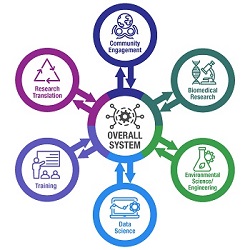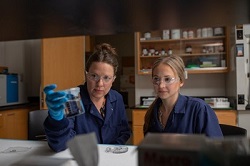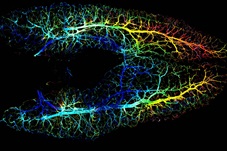Superfund Research Program
January 2022

The annual meeting to celebrate the 35th anniversary of the NIEHS Superfund Research Program (SRP) was held as an abbreviated virtual event December 16, 2021. Drawing over 400 attendees from across the U.S., the meeting highlighted how SRP's dedication to innovation and collaboration across scientific fields can tackle emerging challenges.
The meeting drew from SRP's innovative COVID-19 projects, collaborative data science projects, effective risk communication strategies, and leadership in climate change and health research.
During opening remarks, SRP Director William Suk, Ph.D., emphasized SRP's commitment to using a systems approach to research.
"This approach builds on the existing infrastructure of SRP centers, which allows researchers to combine the biomedical and environmental fields and work with community members and other partner to provide solutions for existing and emerging environmental health problems," Suk explained.
Leading the Way in Climate Change and Health Research
After his opening remarks, Suk passed the virtual microphone to NIEHS and National Toxicology Program Director Rick Woychik, Ph.D., who described the NIEHS' commitment and leadership in supporting climate change research. He emphasized how certain groups, such as some low-income communities and people with disabilities, are disproportionately vulnerable to the effects of climate change.
"SRP's infrastructure, together with the holistic systems approach, well positions SRP researchers to tackle complex and pressing issues, like climate change and health," Woychik said.
Walking in Wetterhahn's Footsteps

An avid mentor, Frazar (left) wants to inspire underrepresented groups, particularly women, to pursue a career in science. Here, she is pictured with undergraduate mentee Anicah Smith.
(Photo courtesy of Molly Frazar)
Molly Frazar, a Ph.D. candidate at the University of Kentucky SRP Center, was announced as the recipient of the 2021 Karen Wetterhahn Memorial Award. Her remarks reflected on the mentorship, struggles, and breakthroughs that made her the scientist she is today. She described her research exploring sustainable and affordable ways to remove per- and polyfluoroalkyl substances (PFAS) from drinking water.
Read more about Frazar's research in a recent NIEHS Environmental Factor article.
K.C. Donnelly Externship Trainees Excel at Remote Research
The meeting also featured several of the 2020 K.C. Donnelly Externship recipients, who discussed their collaborative research projects conducted with other SRP Centers, laboratories, and federal agencies across the country.
Two trainees tackled bioremediation projects, which use bacteria and other organisms to clean up contaminated sites:
- Jessica Ewald of the University of Iowa SRP Center worked with Duke University SRP Center researcher Claudia Gunsch, Ph.D., to analyze genes in bacteria known to degrade polychlorinated biphenyls and understand how certain molecular changes could alter that process.
- Duke University SRP Center trainee Paige Varner described her work with Joshua Michener, Ph.D., of the Oak Ridge National Laboratory to explore how to enhance native bacteria with genes that promote their ability to degrade polycyclic aromatic hydrocarbons (PAHs).
Some trainee projects focused on connections between contaminants and health:

During a short break between presentations, meeting attendees viewed trainee submissions from SRP's summer scientific art competition, such as this image of a zebrafish ovary captured by Brown University trainee Michelle Kossack.
(Photo courtesy of Michelle Kossack)
- Katlyn McGraw from the University of Louisville SRP Center worked with Columbia University SRP Center Director Ana Navas-Acien, M.D., to explore the associations between exposure to volatile organic compounds and cardiovascular health.
- Columbia University SRP Center trainee Ahlam Abuawad described her work with Margaret Karagas, Ph.D., of the Dartmouth College SRP Center. Using data from a long-term research project that tracks the health of pregnant women and their children, Abuawad looked at the relationships between arsenic exposure and gestational diabetes.
- Oregon State University SRP Center trainee Yvonne Rericha presented on her work with Robert Creton, Ph.D., and Jessica Plavicki, Ph.D., at the Brown University SRP Center. Rericha used advanced imaging techniques in zebrafish to explore how exposures to PAHs and PFAS affect the brain.
Other trainee projects focused on understanding the distribution of contaminants in the environment:
- Maya Spaur of the Columbia University SRP Center worked with Melissa Lombard, Ph.D., and Joseph Ayotte of the United States Geological Survey New England Water Science Center to explore associations between arsenic levels private well water compared to community water systems in the U.S.
- Jamie Kelly, Ph.D., from the Massachusetts Institute of Technology SRP Center, worked with Benjamin DeAngelo, Ph.D., of the National Oceanographic and Atmospheric Administration, and Terry Keating, Ph.D., and Kathleen Raffaele, Ph.D., of the U.S. Environmental Protection Agency (EPA). Their goal was to create a model to identify the source of PAH emissions to inform health protective strategies.
- University of Rhode Island SRP Center trainee Anna Robuck worked with Mark Strynar, Ph.D., and James McCord, Ph.D., at the EPA's Office of Research and Development to assess the presence of PFAS in water and fish samples from the Delaware River Estuary to estimate the total amount of PFAS in the system.
"Training the next generation of environmental health scientists has been a major aim of the SRP program since the beginning," Suk said. "Today's presentations are an outstanding example of how creative these trainees are to move science forward despite the challenges of the last two years."
to Top


